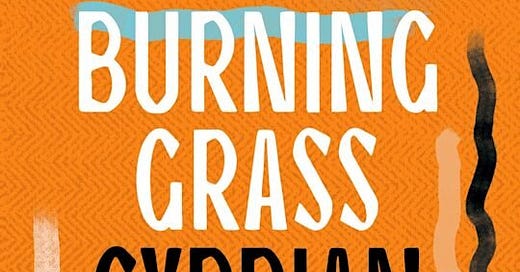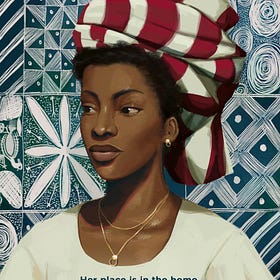In the dry, arid lands of Northern Nigeria, where the Fulani migrate from one region to another in search of favourable weather, Cyprian Ekwensi’s Burning Grass weaves a tale of Mai Sunsaye’s wanderings after being struck with a mystical wandering sickness, and the subsequent efforts of his family to find him.
Greetings, once again dear reader👋🏽👋🏽
I hope you are doing well and taking good care of yourself.
Welcome to another edition of this spectacular newsletter
Today’s newsletter is a guest feature by Doyin, a lover of all things art—literature, music, paintings, and movies. You can mostly find him reading, writing, or daydreaming about the Corleone family. He's addicted to cakes, books, and suits. He writes from Lagos and tweets @AjayiAdedoyin14
Mai Sunsaye’s wanderings are twofold in nature—a desire to find Fatimeh and bring her to Rikku’s arms and an uncontrollable wandering caused by the sokugo.
Ekwensi crafts a story that straddles the line between reality and mysticism. His characters hold as much belief in the physical as they do in the mystical. Magic is used for warfare and protection. As the chief of his village, Mai Sunsaye makes charms and amulets. Hodio, his second son, uses the baduhu against Shehu in battle. As Mai Sunsaye tells his son, Jalla, who is deeply embarrassed after losing out at the sharro, a test of masculinity, “one does not go to the sharro without adequate preparation.”
It is rather fascinating to see the readiness with which the physical and mysterious elements dictate the lives, beliefs, and subsequently, actions of the Fulani. Both aspects are woven deeply into their consciousness that at some point, they seem to become one and the same. His family’s quick acceptance of Sunsaye’s wandering disease, sokugo, points to this.
“Shaitu’s life, like that of any other Fulani, was ruled by beliefs for which she could find no logical explanation. She accepted happenings but associated them with inanimate objects and peculiar circumstances. A talisman could bring luck…a man may strike down his enemy by calling his name aloud and firing a needle into the sky…”
Like Ekwensi’s other novels set in Northern Nigeria (The Passport of Mallam Ilia and An African Night’s Entertainment), Burning Grass also glows with a noticeable theme of heroism. Characters embark on valiant and often dangerous quests for a range of reasons: to avenge wrongs, prove their masculinity, and to restore stolen honour and dignity.
Hodio hunts Shehu and two of his lackeys and sends them running. Mai Sunsaye rides into battle to save his youngest son, Rikku, from imminent slavery. Ligu also readies her men for war against Shehu to ensure Rikku’s rescue.
“…I am Hodio, son of Sunsaye. We are Fulanis, sons of Dan Fodio, master magicians, we who fight like cats, who die a hundred deaths and live, we who test our manhood by the sharro…”
Though Mai Sunsaye ends up being cured of his wandering disease by Fatimeh, his former slave girl, his many wanderings leave him wearied and he dies as a result. His three sons, however, chose different paths that signal a gradual acceptance of modernity over traditional ways. Their choices reflect this growing acceptance of modernity. Hodio, for instance, takes charge of a sugar mill, rejecting the popular occupation of cattle rearing synonymous with the Fulani.
Ekwensi displays his adeptness at crafting stories that reflects the vagaries of urban life as well as the mysteries of rural life. Through his works, he gives an insight into the culture and ways of the Fulani—a proud people, brave and daring.
Have you read this book? What did you think about it? Leave a comment, maybe? 😊
#67: Not Iyawo Alarede (More Than Just a Wife)
When I first saw the title of this book, it reminded me of a book I read for Yoruba Literature in Secondary School. I’m not sure why because I can’t even remember the story. How much simpler life was when my biggest worry was getting to school early and passing CA tests but I digress not.






